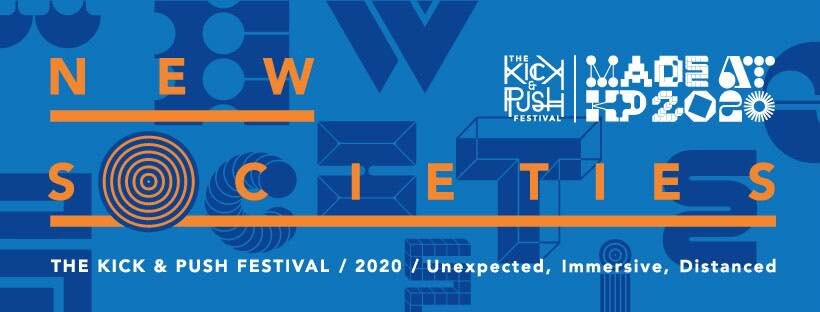Re-inventing play: New Societies at the Kick and Push Festival

Given the chance to create utopia, what would it look like? Would it be possible? And would we even want to?
There is no better time than now for the Kick and Push Festival to meet New Societies. Fusing strategic gameplay with a theatrical narrative, the Vancouver/Toronto-based company Re:Current Theatre has created an experience that is as immersive as it is interactive. There’s a thrill upon joining the Zoom call, and a good chance this is the largest meeting you’ve ever joined. Everyone is buzzing with the anticipation of what their evening (and society) will hold, and who exactly will be the ones they’re playing with.
The project was inspired and led by Brian Postalian for his Masters thesis at Simon Fraser University, but he is by no means its sole creator. An international collective of 11 individuals, they seek not to maintain order but to provide participants with the means to alter the live experience to their liking. What New Societies explores is if (and how) we replicate the conditions of our own social structures in the face of an opportunity to craft a better one.
There’s a series of influences they’re pulling from—Catan, Risk, Dungeons and Dragons, Minesweeper—but the most important gaming mechanics are about priming an audience to be invited to do particular things. Particularity is the key element that reflects choice and consequence, and the structures those games provide are reconfigured into something more flexible for performance. Going through an extensive list of ‘what-if’ scenarios, the development of New Societies primarily involved training the team how to handle structural improvisation and keeping the show from going off the rails.
After a presentation by Upintheair Theatre’s eVolver Festival this past June, Re:Current Theatre is returning to the show with a few renovations. They were very intentional with the online adaptation, and although it’s an incredibly different experience online, the same impulse is there. Meeting and rehearsing from various corners of the world, the team remains conscious of what it means to gather. Postalian explains their biggest challenge: “We’re trying to figure out how to make the screen less flat.”
So what does crafting utopia say about the ones producing it? That question should be posed to the audience as much as it should be to the creators. The facilitators never explicitly tell you how to play the game, but the competitive nature of New Societies does influence our relationship to the resources in the game and the choices we would make regarding land, people, and progress. The outcome of our decision-making is tied to success (and in such a linear and efficient fashion), so the process of how our current society was crafted is reflected in the construction of this new one. If the competitive gameplay leads us to create the society we’ve already created, are we really able to craft a new society, or are we just looking to improve the conditions we’re subjected to?
Postalian is surprised by how quickly people have caught onto their ideas in discussion—ideas of utopia, of empires, of control. Catalysts of thinly-veiled real world situations are put in conversation with the current cultural climate which primarily feels like the collapse of civilization. There’s a greater awareness amongst the audience in relation to these conflicts that wasn’t at the forefront of our collective consciousness a year ago.
“It’s a good thing, but it definitely changes how people are encountering the things that are happening in the show,” Postalian notes. “Back then it felt almost foreign, almost historical. And now it’s like ‘this is actually happening!’ People are already charged with a socio-political mindset where I think before the show caught them off guard.”
Perhaps it is the narrative of utopia that happens in one’s mind, but not on the table. What we consider ideal is relative, and there’s a lot about the self that is revealed in performance and in relation to the people you’re surrounded by. How much are you willing to adhere or submit to own ideals? What senses of coercion or obligation arise? And at what point do we all come into conflict? The thing is utopia can happen for you, but it can’t be enforced or mandated or agreed upon for it to be truly ‘utopic’. “It depends on who’s in the room and the ways they use their diplomacy to navigate the latter half of the game,” he admits.
In the midst of a pandemic and rising global tensions, the need for connection has increased tenfold. Any conclusions about an ideal society are impossible, unlikely, or open-ended. Utopia is the often opposite of what it’s supposed to be, and indeterminate in capacities we can’t even fathom. But the most significant understanding of the experience Re:Current Theatre has curated is the drive towards utopia, not that we achieve it. And when you create an environment where people want to engage (with the piece and with each other), games provide a way to experience connection with other people.
What New Societies reflects to its participants is our capacity for empathy, resilience, and creativity. And we’re reminded what, or who, we consider home.
